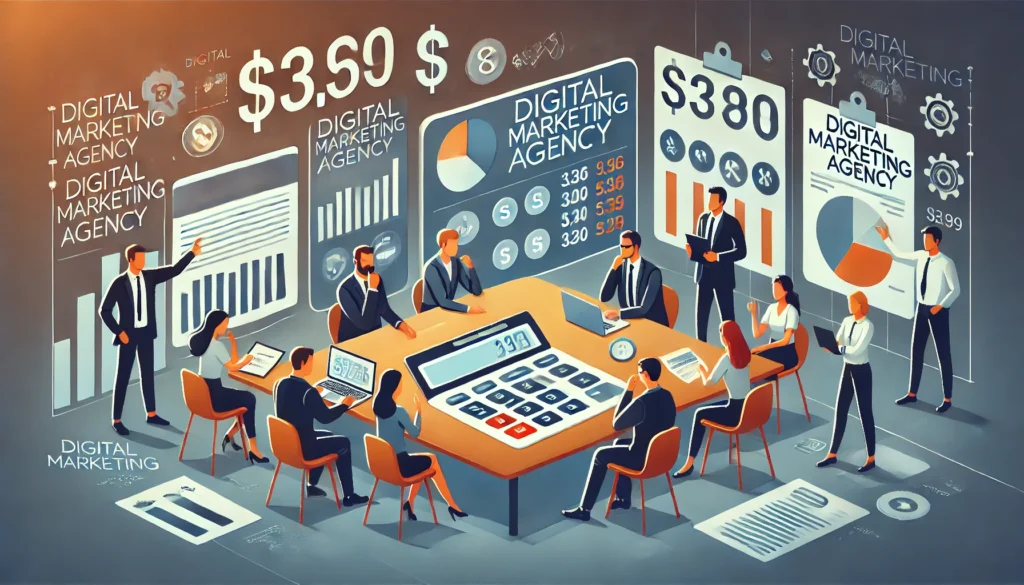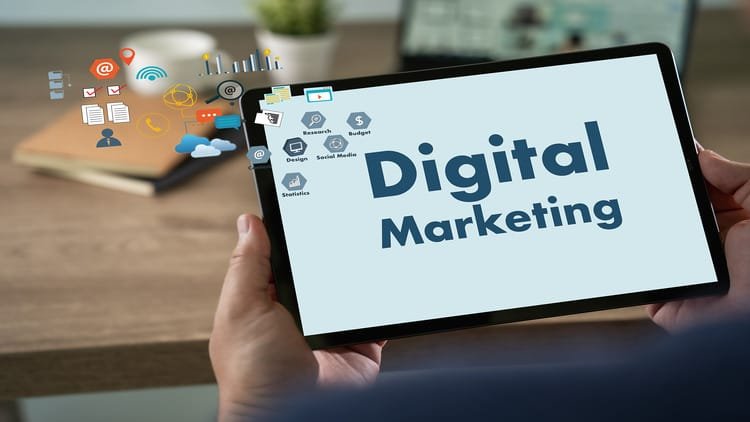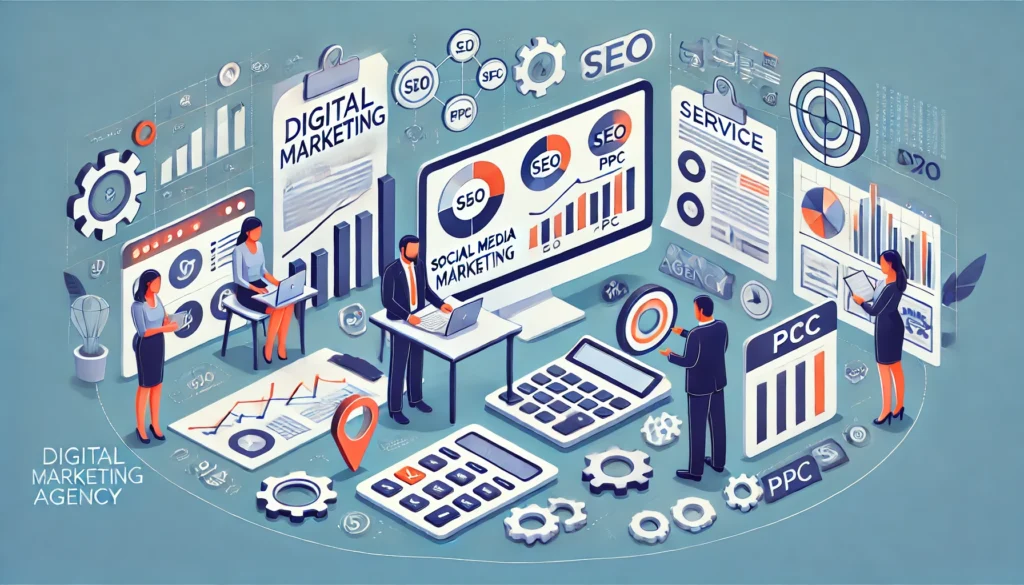In today’s competitive landscape, digital marketing has become a critical part of business growth. Whether you’re a small business owner or a large corporation, understanding how much to pay a digital marketing agency can be challenging. Digital marketing services, including everything from social media management to SEO, often come with varying pricing models.
In this blog, we will break down the costs, giving you a clear picture of what to expect from a digital marketing agency pricing. Understanding these fees will help you make informed decisions based on your marketing strategy and budget.

Understanding Digital Marketing Agency Fees
When you decide to hire a digital marketing agency, one of the first things you’ll need to understand is how they structure their fees. Pricing models vary based on the agency, services offered, and the complexity of your marketing campaigns. In this section, we will explore the foundation of agency pricing structures and typical cost ranges for services such as social media marketing, SEO, and more. By knowing what drives these fees, you can better evaluate your marketing budget and set realistic expectations for your campaigns.
The Basis of Agency Pricing Structures
Digital marketing agencies generally follow a few common pricing structures. The three most common types are retainer-based, project-based, and flat-rate fees. A retainer model involves a monthly fee, giving you ongoing support and services. Project-based pricing is ideal for short-term goals, where you pay for the project as a whole. Finally, flat-rate fees often apply to fixed services, such as web design or a specific SEO package. Each pricing structure offers unique benefits depending on your digital marketing strategies and overall business goals.
Average Cost Ranges for Digital Marketing Services
The cost of digital marketing services can vary widely depending on your business needs and the agency’s expertise. For example, social media management could range from $500 to $5,000 per month, depending on the complexity and the amount of time required. SEO services often come in at $750 to $2,000 per month, while PPC management could cost anywhere from $1,000 to $10,000 per month based on your ad spend. Understanding the average cost ranges will help you set a reasonable marketing budget that aligns with your goals.
Key Pricing Models Explained
Digital marketing agencies typically offer several pricing models, each designed to meet different client needs and preferences. The two most common models are retainer-based and project-based fees. Additionally, many agencies offer hourly rates or fixed packages to accommodate varying levels of service. Understanding these pricing models is key to choosing the best option for your business and ensuring your digital marketing campaign stays on track and within budget.

Retainer vs. Project-Based Fees
Aretainer model is a recurring monthly payment, giving you continuous access to the agency’s services. This model is ideal for businesses looking for long-term digital marketing support, such as ongoing SEO, social media management, and content marketing.
On the other hand, project-based fees are one-time payments for a specific service or campaign, such as launching a new website or running a short-term PPC ad campaign. This pricing model is perfect for businesses with clearly defined short-term goals. Understanding these common pricing models will help you align your digital marketing campaigns with your overall business strategy.
Hourly Rates and Package Options
Some digital marketing agencies offer hourly rates, which are ideal for businesses needing short-term or specific marketing assistance. Hourly rates can range from $50 to $200 per hour, depending on the agency’s expertise. Package deals, often based on a flat rate, offer a comprehensive set of services, like SEO optimization or social media management, bundled together.
Packages can be more cost-effective for businesses that require multiple services but want to avoid the unpredictability of hourly fees. Assessing your business’s needs will help you determine if an hourly rate or a package from a digital agency is the better option.
Breakdown of Costs by Service Type
Digital marketing agencies provide a wide range of services, each with its own pricing structure. Understanding the costs associated with specific services like SEO, social media management, and email marketing can help you make informed decisions based on your business needs. Here’s a breakdown of common costs by service type to guide your marketing budget.
SEO and Content Marketing Expenses
The cost of SEO and content marketing services varies depending on the scope and goals of your campaign. An SEO agency typically charges between $750 to $2,000 per month for services like search engine optimization and keyword research. These fees often include on-page SEO, off-page strategies, and local SEO optimization.
Content marketing, such as blog posts or whitepapers, can range from $100 to $500 per piece, depending on the depth of research required. Integrating Google Ads can further boost visibility, with costs ranging based on ad spend.
Social Media and PPC Management Costs
Social media marketing campaigns can range from $500 to $5,000 per month, depending on the number of platforms, audience targeting, and engagement efforts. This cost includes social media management, where agencies handle posting, audience interaction, and performance monitoring. Additionally, Facebook ads and PPC (Pay-Per-Click) management are often tied to your ad budget, with agencies charging either a flat fee or a percentage of your ad spend, typically ranging from $1,000 to $10,000 based on the scope of the campaign.
Email Marketing and Automation Pricing
Email marketing campaigns, which include list segmentation, design, and automation tools, typically range from $300 to $2,000 per month. The cost depends on the size of your email list and the complexity of your automation workflows. Email marketing is an essential tool for building brand awareness, nurturing leads, and driving conversions. Automated email sequences often increase efficiency and reduce manual effort, offering excellent returns on your marketing strategy investment.
E-commerce and Mobile Marketing Strategies
E-commerce marketing strategies, including website optimization and product promotion, can range from $1,000 to $10,000, depending on the scale of your business and specific marketing needs. Mobile marketing strategies, which focus on targeting users on mobile devices, can cost anywhere from $500 to $3,000 per month. These strategies are essential for reaching potential customers on their smartphones and tablets, a crucial component in today’s business growth efforts.
Factors Influencing Agency Pricing
Several factors influence the pricing models of digital marketing agencies. These factors can vary depending on the level of expertise, the complexity of the campaigns, and the target market. By understanding these factors, businesses can better evaluate the costs associated with hiring a digital marketing agency and align their goals with their budget.

Agency Expertise and Specialization
Agencies with specialized services or a high level of expertise often charge higher fees. Digital marketers with niche experience in specific industries or cutting-edge strategies may drive up costs due to the value they bring to campaigns. Factors such as certifications, advanced tools, and years of experience contribute to higher prices. Agencies with a strong portfolio of successful campaigns may also justify a higher agency fee to reflect their expertise.
Complexity of Marketing Campaigns
The complexity of a digital marketing campaign can significantly affect pricing. Campaigns that require multiple channels, intricate targeting, or extensive analysis demand more time and resources. For example, a campaign involving SEO, content creation, and PPC will naturally have a broader scope of work and take more effort than a simple email marketing strategy. The more complex the campaign, the more time is required, which increases costs.
Target Market and Industry Demands
Pricing can also vary based on the target market and industry. Agencies may charge more when targeting competitive audiences or working in high-demand industries, where campaign customization is crucial to stand out. Larger companies with a broader audience tend to have higher costs compared to smaller businesses.
Evaluating Your Digital Marketing Investment
Investing in digital marketing is about more than just the initial cost; it’s about ensuring long-term growth and profitability. To make an informed decision, businesses need to consider the return on investment (ROI) and how a digital marketing agency can help achieve their long-term goals.
Return on Investment (ROI) Considerations
ROI is a crucial metric when evaluating your digital marketing spend. Successful campaigns should yield measurable results such as increased traffic, conversions, and improved user experience. When evaluating the effectiveness of your digital marketing efforts, consider how well the agency helps meet your business goals, whether that’s growing brand awareness or generating leads. Analyzing the return on investment will help you decide if your marketing budget is being well spent.
Long-Term Value vs. Short-Term Costs
While investing in a digital marketing agency may seem costly upfront, the long-term benefits often outweigh the short-term costs. A well-executed marketing strategy can help build brand loyalty, foster ongoing engagement with customers, and ultimately drive business growth. Business owners should consider the long-term value that a professional agency can bring, rather than focusing solely on the immediate expense. By considering the ongoing process of marketing, you can maximize your marketing budget and get the best results.
How to Negotiate with a Digital Marketing Agency
Negotiating with a digital marketing agency is a vital step to ensure you get the most value for your budget. By setting clear expectations and understanding the scope of services upfront, you can avoid potential misunderstandings and control costs effectively.

Setting Clear Goals and Expectations
Before starting negotiations, it’s crucial to define your marketing strategy and set clear goals. This helps the agency understand your needs and propose a suitable plan. A well-defined scope of work ensures that both parties are aligned, helping you control the agency fee and stay within your marketing services budget.
Understanding Scope of Services
To avoid any surprises during the project, it’s essential to discuss the services included in your package. Clarify the exact deliverables, timelines, and the amount of time dedicated to your project to ensure you get the best value from the digital agency. This understanding prevents scope creep and helps establish the next step for success.
Making the Decision: DIY Marketing vs. Hiring an Agency
When deciding whether to handle marketing in-house or hire a digital marketing agency, businesses must assess their capabilities and long-term goals. Each option has its benefits, and understanding when to outsource is key to achieving optimal marketing results.
Assessing In-House Capabilities
For smaller businesses or those with strong internal marketing skills, handling tasks like social media management or web design in-house may be more cost-effective. However, managing digital marketing services on your own requires expertise, tools, and time, which can detract from other areas of your business. Business owners should assess if their team has the resources to handle marketing in-house effectively.
When to Consider Outsourcing to Professionals
Outsourcing to a professional digital marketing agency can lead to better results when a business lacks the time, tools, or expertise to manage campaigns effectively. Professional marketing companies bring industry experience and a dedicated team of experts, including graphic designers and strategists, to execute your campaigns. When growth and ROI are top priorities, outsourcing is often the best solution.



